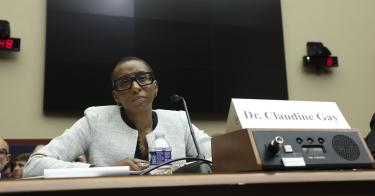Anyone who listened to the college presidents defending calls for the genocide of Jews with condescending smirks in their Dec. 5 congressional testimony could see they were insufferably smug. But then we got evidence that Ivy League universities may not have selected the best and brightest to lead them.
Consider Harvard President Claudine Gay, who evinced no ability to think on her feet or even adjust wording undoubtedly scripted for her by lawyers. Yet despite her brilliant display of dullness, Ms. Gay grinned as though she were the cleverest in the room.
This was, perhaps, understandable. Ms. Gay is, after all, president of Harvard University. Typically, you get to be president of Harvard only if everyone knows that you are very, very smart. After her shameful performance, however, it should come as no surprise that Ms. Gay rose to this post despite a shockingly unimpressive scholarly record.
Manhattan Institute senior fellow Christopher Rufo has since produced convincing evidence that Ms. Gay plagiarized parts of her dissertation. Failing to properly quote source material can either be a sign of carelessness or a symptom of struggling to generate original ideas. Her academic output since then suggests it was the latter.
Over about two decades, Ms. Gay has written 10 journal articles and no books. This is about half the average rate for a political science professor, even at a middling university. By comparison, Amy Gutmann—who like Ms. Gay is a political scientist and until early last year served as president of the University of Pennsylvania—has published more than a dozen books and well over 100 articles.
>>> College Presidents Expose the Moral Rot Within Their Institutions
Some academics make their name by developing one profound insight into an important question. Others make their reputation by offering consistently interesting insights on a range of questions. Ms. Gay has done neither. She has authored only a handful of articles offering uninteresting insights on the narrow question of African American political opinion and representation.
In her last article, published six years ago, titled “A Room for One’s Own?,” Ms. Gay found that Democratic governors direct federal housing subsidies to supportive constituencies when they have the discretion to do so. Amazing!
In “Knowledge Matters,” Ms. Gay found that political ignorance is a key reason why African Americans support Democrats despite policy disagreements. Who knew?
In “Seeing Difference,” Ms. Gay found that African Americans resent economically successful Hispanic neighbors. Wow!
How did Ms. Gay rise so far despite such a mediocre academic record? You already know how, or at least part of how. Ms. Gay is a woman of color, and within the liberal ivory tower of Harvard, it’s impermissible for a White professor to accuse a woman of color of being intellectually mediocre. Only a Black professor could possibly do that.
It’s interesting, then, that Ms. Gay’s institutional rise was marked by a pattern of destroying the careers of genuinely brilliant Black scholars who had the stature to point out her mediocrity.
Harvard economist Roland Fryer, for example, has published more in a single year than Ms. Gay has in her entire career. But while serving as the dean of faculty, Ms. Gay led the charge to strip Mr. Fryer of almost all of his academic privileges on trumped-up charges of having run an office with a hostile work environment.
As documentary filmmaker Rob Muntz put it, “Fryer was the victim of a coordinated professional assassination. And … the chief architect of that assassination was none other than Claudine Gay.”
Another target of Ms. Gay’s character assassination was Ronald Sullivan, a Black professor at Harvard Law School. In addition to being an accomplished law professor, Mr. Sullivan was dean of Winthrop House, one of Harvard’s residence halls. After Mr. Sullivan agreed to serve as an attorney to help defend Hollywood mogul Harvey Weinstein against rape charges, several Winthrop House students complained that they no longer “felt safe.”
>>> College Presidents Just Showed America Their Moral Cowardice
When she realized that it would be impossible to remove Mr. Sullivan for providing legal representation, Ms. Gay launched a witch hunt to find a pretext for his removal. Despite a decade of leading Winthrop House without incident, Ms. Gay insisted that he had presided over a hostile environment.
Ms. Gay’s appointment as Harvard president felt like an “emperor has no clothes” moment. If academics can’t admit or even think that someone is an affirmative-action pick, then Harvard just pretended that she was robed in the finest scholarly garb. What harm could come to Harvard from picking Ms. Gay as its president? As it turns out, quite a lot.
Although one doubts that Harvard’s newfound institutional commitment to free speech would extend so far as to permit speaking obvious truths, the truth is now abundantly clear not only on campus but also across the country. Everyone paying attention knows that Harvard picked its president because of her immutable characteristics despite her lack of scholarly accomplishment.
The country can also reasonably suspect that Harvard is refusing to fire its president despite her manifest failure to respond properly to the current wave of antisemitism on campus and despite credible allegations of plagiarism because of her immutable characteristics. Perhaps the Harvard board of trustees will act with integrity, but we rather doubt it.
It seems more likely that Harvard will be stuck being led by an academic whose alleged early plagiarism could not plausibly be redeemed by the merit of her later scholarship. Play DEI games, win DEI prizes.
This piece originally appeared in The Washington Times




